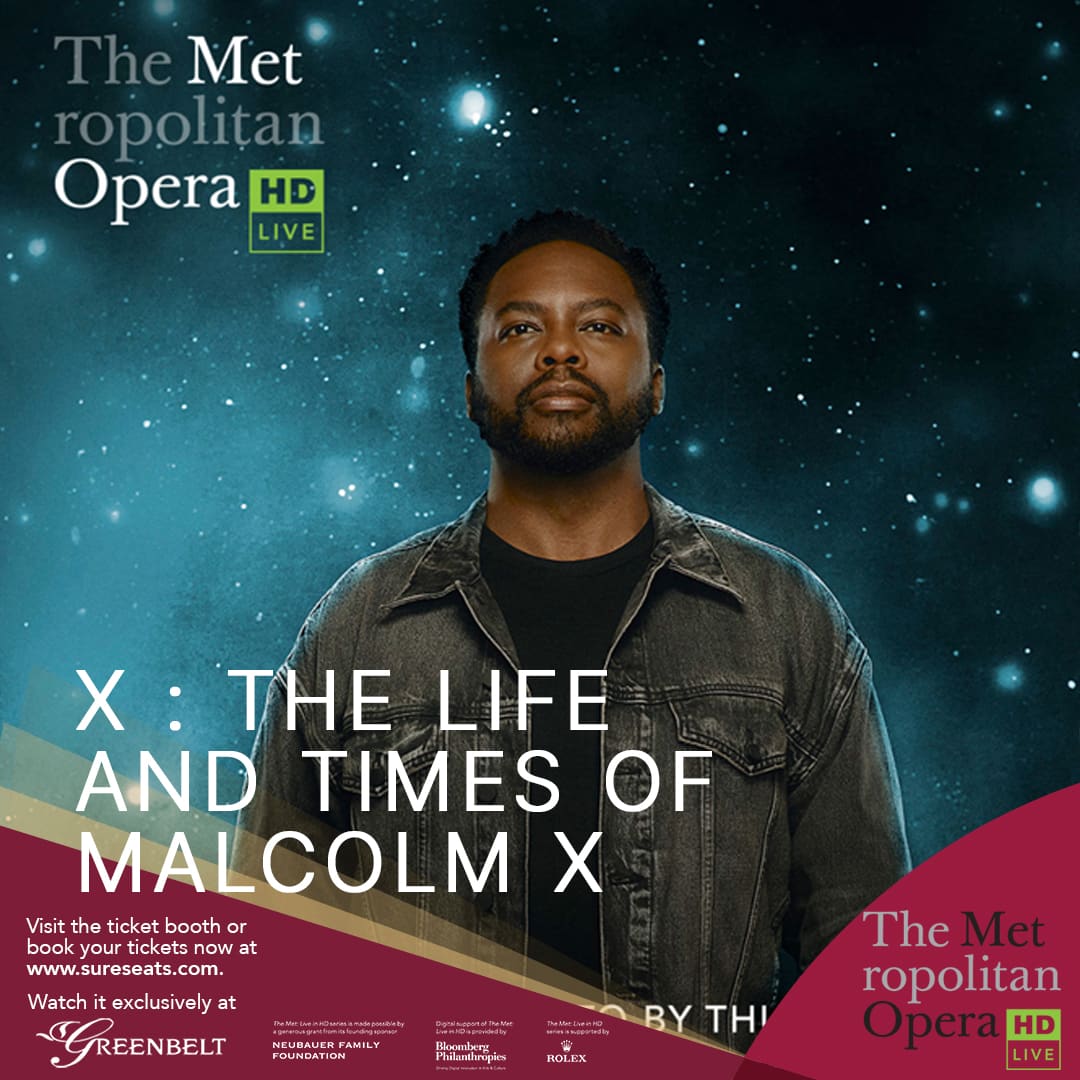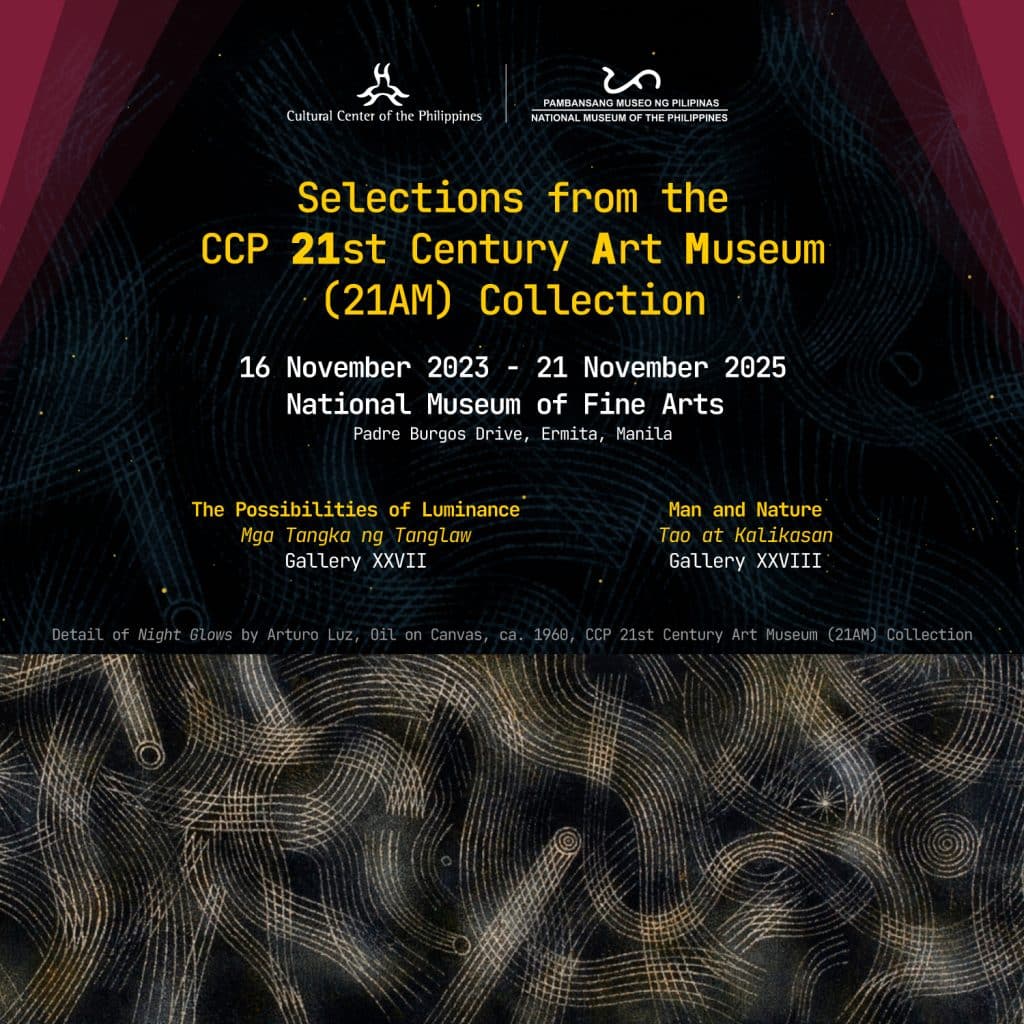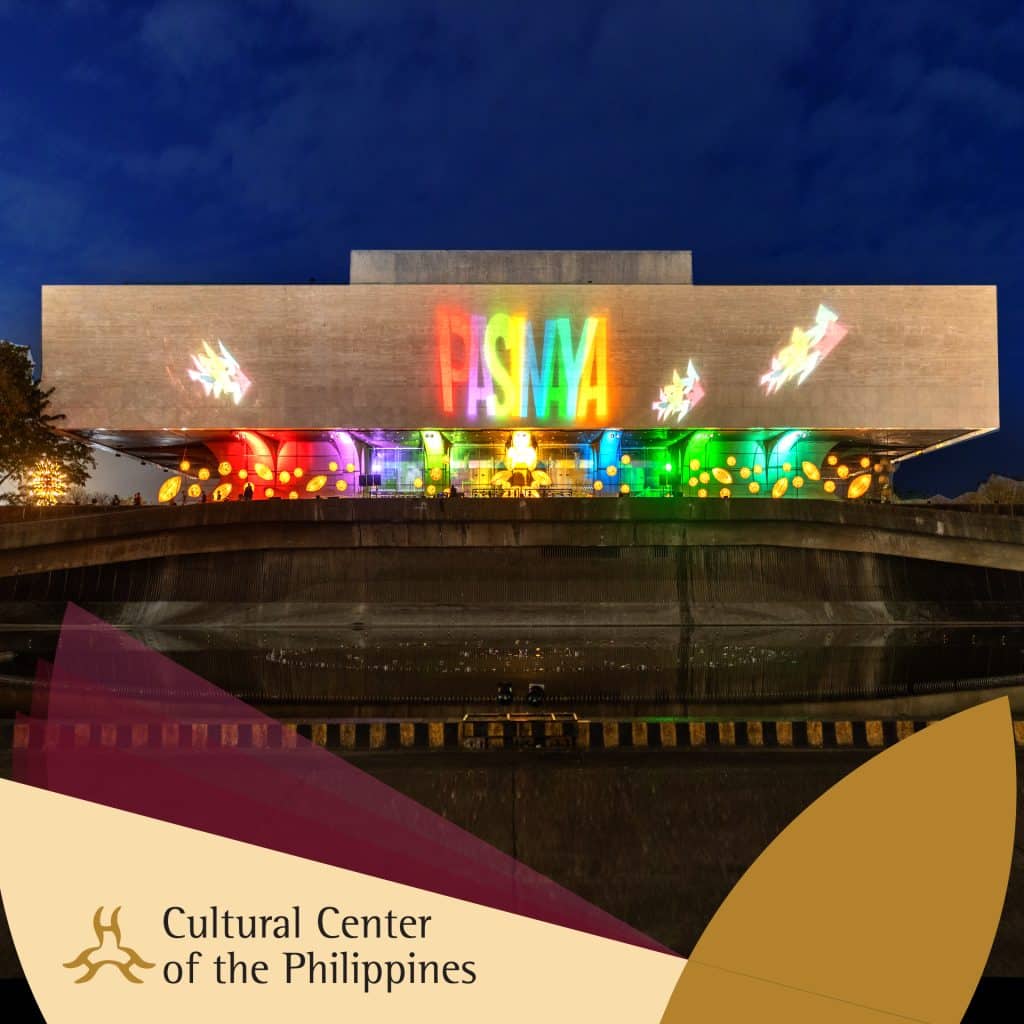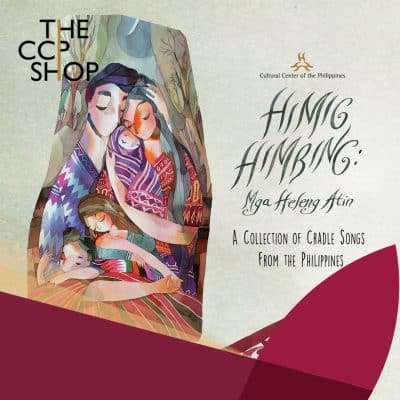THE MET: LIVE IN HD SEASON 9 – ANTHONY DAVIS’ “X: THE LIFE AND TIMES OF MALCOLM X”

THE MET: LIVE IN HD SEASON 9 – ANTHONY DAVIS’ “X: THE LIFE AND TIMES OF MALCOLM X”
PRESENTED BY:
The Cultural Center of the Philippines
with the Metropolitan Opera of New York, the Filipinas Opera Society Foundation, Inc. and
Ayala Malls Cinemas
DATE/ TIME/ VENUE:
June 4, 2024 | 5:30 PM
CCP @ Ayala Malls Cinemas
Greenbelt 3 Cinema 1, Makati City
DESCRIPTION:
Anthony Davis’s groundbreaking and influential opera, which premiered in 1986, has arrived at the Met at long last. Theater luminary and Tony-nominated director of Slave Play Robert O’Hara oversees a potent new staging that imagines Malcolm as an Everyman whose story transcends time and space. An exceptional cast of breakout artists and young Met stars enliven the operatic retelling of the civil rights leader’s life. Baritone Will Liverman, who triumphed in the Met premiere of “Fire Shut Up in My Bones,” sings Malcolm X, alongside soprano Leah Hawkins as his mother, Louise; mezzo-soprano Raehann Bryce-Davis as his sister Ella; bass-baritone Michael Sumuel as his brother Reginald; and tenor Victor Ryan Robertson as Nation of Islam leader Elijah Muhammad. Kazem Abdullah conducts the newly revised score, which provides a layered, jazz-inflected setting for the esteemed writer Thulani Davis’s libretto.
The Met: Live in HD Season 8 is a series of screenings of the latest performances by the Metropolitan Opera of New York, delivered in high-definition video and Dolby Surround Sound.
Content Advisory:
X: The Life and Times of Malcolm X contains strong language.
TICKET INFORMATION:
Ticket Price:
Php 350 – Regular Price
Php 100 – Students and Young Professionals
Visit the ticket booth or book your tickets at www.sureseats.com.
REVIEWS:
“True staying power … Its unbroken flow from genre to genre [is] AS GRACEFUL AS ANYTHING IN OPERA … Speaks to contemporary life … Dreams of a better future … Has the opportunity to become what is always should have been: AN AMERICAN CLASSIC.” — The New York Times
“Not just a THOUGHT-PROVOKING show, it is also highly entertaining. YOU MUST GO SEE MALCOLM X.” — MSNBC
SYNOPSIS:
“X: The Life and Times of Malcolm X” by Anthony Davis
Estimated Running Time: 3 hrs 20 min
ACT I
1931, Lansing, Michigan. At the home of Reverend Earl Little and his wife, Louise, a meeting is taking place of the local chapter of Marcus Garvey’s Universal Improvement Association, and Rev. Little is late. Louise has been tense all day, and members of the meeting are concerned about active white supremacist groups terrorizing local people. Louise remembers past attacks that haunt her. A policeman arrives to say that Rev. Little was killed in a streetcar accident. The neighbors ponder what may have really happened, and Louise becomes distraught, sings to herself, and soon becomes unreachable. A social worker comes to the home sometime later and declares the Little children to be wards of the state. Malcolm tries to reach his mother, who does not react to him. She is hospitalized. His older half-sister appears to take him to her home in Boston.
About 1940, Boston. Still very much a country boy, Malcolm is introduced to Ella’s middle-class black Boston and, through his discovery of the music there, finds himself in the local after-hours life, with his guide, a character named Street. But as a young adult, he gets involved with some people who rob a wealthy home, and he is arrested.
In an interrogation room, Malcolm reveals the anger over the troubles that have long plagued people like him.
ACT II
1946–48. Malcolm broods in jail when his brother Reginald comes to visit. Reginald tells him about Elijah Muhammad, leader of the Nation of Islam, whose teachings he thinks will help his brother. Malcolm begins to study the Nation’s teachings and read many books. He becomes a serious and more hopeful man. Malcolm X is born.
The jail recedes as Malcolm hears and then sees Elijah. It is as if the word removed the bars. They come face to face. Elijah embraces Malcolm like a son. He tells him he has much to learn to spread Allah’s word and sends him out to start temples. He is an electrifying speaker.
1954–63. Malcolm begins his ministry, helping to found temples in Boston, Philadelphia, Springfield, Hartford, Atlanta, and New York. This scene spans several years in telescopic fashion. The period includes some of the heights of the civil rights era and closes with the assassination of President John F. Kennedy. Malcolm is seen speaking on various Harlem street corners as time passes. He always takes the crowd.
Malcolm warms to his task when speaking before more and more exuberant crowds and decries some of the peaceful protests in the South as Malcolm defines his own political position.
He leads an anthem declaring “We are a nation.” At the end, he is asked about Kennedy’s death and makes a remark lacking in sensitivity to the nation’s mourning. Elijah is enraged.
Malcolm and Betty briefly discuss his upcoming meeting with Elijah. They express the hope that their children will be free to dream without fear.
ACT III
Malcolm is called to see Elijah, who is both disturbed that this spokesman for the Nation may have put the organization in jeopardy and that he may have become too powerful. Malcolm is disparaged by other Muslims as he comes to the meeting. The Nation is splintering into vying factions. Elijah silences Malcolm for three months, and Malcolm consents to the will of his leader.
He visits with his family, disheartened by the turmoil dividing his community and reporters hounding his every step. Betty hands him a ticket and tells him to go to Mecca, to spend time alone, and find his way. He decides to simply trust in Allah and ask for His help.
Malcolm is in Mecca, dressed in the simple cloths of a hajji and awaiting word as to whether he will be permitted in as a convert and not a man born in Islam. The call to morning prayer sounds, and people there begin to go through the traditional motions of prayer, which are new to him. He watches, imitates the others, and tries to learn the orthodox ritual. He has a larger vision of people across the world united together in faith, rather than by a single ideology.
1964–65. Just before he returns to Harlem, a riot breaks out there. He returns, now a changed man but outwardly the same. He is greeted by reporters who question him about the rioting.
Later, he delivers a speech before his own newly formed group, the Organization of Afro-American Unity. He tells his supporters what he has learned in Africa—that they are a part of a larger movement against colonialism and racism. He is warned of death threats. He is not concerned with the fear so evident around him.
He arrives to give a speech at the Audubon Ballroom in Harlem. After greeting his audience, he is gunned down.
~ Synopsis courtesy of Detroit Opera










